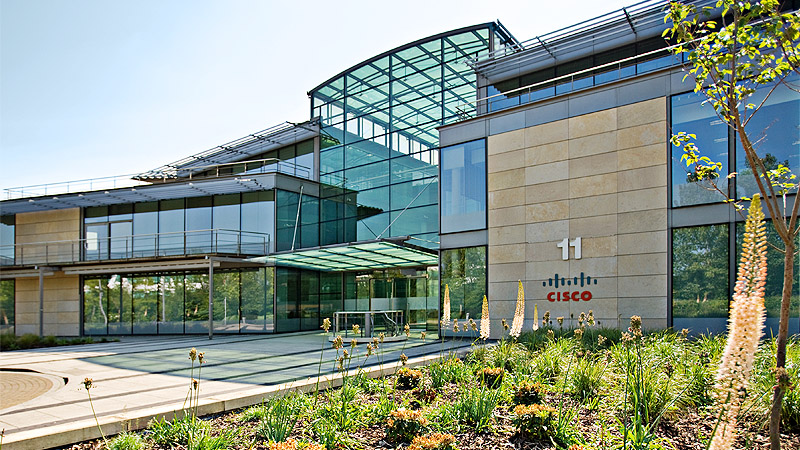SAN JOSE, Calif—April 19, 2018– Providing secure, differentiated and rapidly delivered cloud services to customers is a crucial requirement for today’s service providers. To meet cloud infrastructure demands, global service providers are increasingly turning to the Cisco® Application Centric Infrastructure (Cisco ACI™), the industry-leading software-defined networking (SDN) solution. Cisco ACI reduces operational costs with an automated, policy-based programmable architecture, while improving scalability and security. In addition, new Cisco ACI multi-site management capability helps service providers to connect and manage multiple geographically distributed Cisco ACI fabrics and to move and manage workloads with a single pane of glass.
Cisco ACI is being deployed worldwide by service providers such as NTT Communications (United States), T-Systems (Germany), Hosters (Denmark), scanplus GmbH (Germany), Tieto Oyj (Finland), and Ritter (United States).
NTT Communications
NTT Communications (NTT Com) is a subsidiary of NTT Group and a 20-year IT service provider veteran. The U.S. division of NTT Com recognized a market opportunity to better serve the enterprise market with a portfolio of managed service offerings tailored to key vertical markets that would also meet compliance mandates and regulations.
To succeed in this new direction, NTT Com decided to transform its data centers with a focus on greater security and performance. NTT Com selected Cisco ACI because it offered a much more agile management model over competing industry solutions. NTT Com can now quickly set up highly complex data center domains, bringing new customers onboard in as little as three days, and the security policies inherent in Cisco’s SDN solution also support the compliance needs of its customers.
“Cisco ACI means applications guide the way the network acts, not the other way around,” says Indranil Sengupta, vice president of product engineering at NTT Com. “We’re able to offer an outstanding customer experience with fewer errors and up to 80 percent better application performance.”
T-Systems
With operations in more than 20 countries and multi-billion euro revenues, T-Systems, based in Germany, is one of the world’s leading providers of information and communications technology. Increasingly T-Systems midsize customers are requesting new services based on cloud services and innovative business models, such as data analytics, the Internet of Things, machine-to-machine communications, and industrial Internet. T-Systems selected Cisco ACI to provide its customers with tailored infrastructure, platforms, and software solutions.
“Our customers want high quality services, uncompromised security, and flexibility, all at a reasonable price,” says Andreas Schwall, Delivery Executive Production Midmarket at T-Systems. “Our challenge was to reduce IT effort and maintenance-based outages, while improving capacity at the network and security layer.”
In addition, Cisco ACI allows T-Systems to run more agile, flexible operations and open up new security offerings for customers. “Based on open APIs and an application-centric view of our landscape, we can reduce lead times during the onboarding process and rapidly add more services to our portfolio,” adds Schwall.
Now application traffic steers the network, rather than the other way around, enabling T-Systems to build the network environment around different customer applications, significantly improving performance and better meeting requirements. Optimizing software-defined automation has reduced manual tasks by 90%, providing a productivity gain equivalent to three full-time employees.
Hosters
Hosters, located in Denmark, is a certified Microsoft Azure Managed Service Provider offering cloud and hybrid solutions. The company turned to Cisco ACI to reduce time to market and to provide customers with the right solution easily and quickly. Security was also an important consideration, and Hosters worked with Fortinet and Cisco ACI to ensure the highest levels of security for customers. Cisco ACI is now operating in three Hosters data centers and baby spines, and the company is planning to upgrade its data centers to 100GbE, made easier with the Cisco ACI deployment.
“The results of the Cisco ACI deployment have exceeded our expectations,” said Thomas Raabo, CTO, Hosters. “Our deployment time of new services to customers has been cut down from weeks to hours, and we are spending less time on systems integration and more time on innovation. We’re moving to a DevOps model of continuous improvement, and we’re creating agility and value that can be passed along to our customers.”
scanplus GmbH
As a leading provider of managed cloud services in Germany, scanplus delivers to Deutsche Telekom business customers carrier-grade cloud services with rock-solid service level agreements throughout Europe. scanplus wanted to provide Deutsche Telekom customers with a “cloud in a box” that offered options and full automation and delivery through a self-service portal. scanplus chose Cisco ACI to address these needs, and will also benefit from a network fabric that scales to multiple sites, with single pane-of-glass management and automation. Because scanplus is supporting a large number of business customers in a shared cloud environment, data protection and strict tenant segmentation are essential. Designed for secure multi-tenancy, Cisco ACI makes it possible for applications and users to share the same infrastructure without leaking information across tenant boundaries.
“With Cisco ACI, we have full segmentation of each tenant, and can also reference other tenant objects within a tenant while maintaining isolation, which makes them private, separated, and highly secure,” said Stefan Daiber, head of architecture at scanplus.
Using Cisco ACI multi-site functionality, scanplus is also in the process of extending its network fabric to multiple data centers. Because the solution works with any vendor’s hypervisor, it can easily accommodate the different systems in each location.
“The openness of Cisco ACI is a big benefit,” said Daiber. “It doesn’t just support any hypervisor, but also all of the network equipment surrounding the hypervisor. It gives us a tremendous amount of choice and flexibility.”
Tieto Oyj
Tieto Oyj, headquartered in Finland, is a Nordic software and services company. Tieto has deployed Cisco ACI as a Layer 2 fabric in six data centers in three countries. Tieto’s growth strategy is to shift from providing basic services to also delivering an outstanding experience for its customers. That means being able to deliver services quickly and making it possible to build anything on the application level that a customer wants—without being hindered by the underlying physical infrastructure.
Tieto selected Cisco ACI solution to ensure a holistic architecture with centralized automation and policy-driven application profiles. Using the Cisco ACI unified policy model, the team enforces policy through endpoint groups (EPGs), a collection of network endpoints that includes a wide range of entities, including bare-metal servers, virtual machines, and containers.
“Cisco ACI provides a foundation that we can build on to channel innovation into new services,” said Juha Syrjänen, Head of Connectivity Services Business at Tieto. “We’ll be able to quickly and efficiently deliver basic connectivity services, while building a new connectivity ecosystem between our customers, their other partners, and Tieto.”
Ritter Communications
Headquartered in the United States, Ritter Communications serves more than 45,000 customers in rural Arkansas and Tennessee with advanced voice and data services typically only found in major metropolitan areas. Although Ritter Communications has provided local phone service since 1906, sheer connectivity doesn’t deliver the revenues it once did. Ritter needed to deliver a new set of business-focused cloud services to drive revenue growth. But Ritter had limited operational experience with cloud services, and so did its customers.
“We serve a very rural market, and many network managers are tied to their servers. They wouldn’t feel comfortable putting everything in the public cloud,” said Greg Sunderwood, vice president of engineering at Ritter Communications. “We wanted more differentiation on the front end and more control on the back end.”
Ritter’s Hosted Solutions team found the answer in Cisco Cloud Architecture for the Microsoft Cloud Platform. The integrated solutions feature a combination of Cisco ACI, Windows Azure Pack, and Cisco Unified Computing Systems (UCS®).
“We essentially pull the public cloud into a customer’s environment,” says Brandon Fergerson, senior cloud engineer at Ritter Communications. “Microsoft Azure is the customer-facing management console, and Cisco ACI handles back end infrastructure and network management.”
The Hosted Solutions team has gone from manual provisioning to 100 percent virtual deployments, and customer spending for the new services is 50 to 60 percent higher than Ritter anticipated.
“We’ve turned server-hugging skepticism into cloud-first approaches,” Fergerson says. “I see it all the time. The subscriptions start with just one low-risk server, then it seems like every time I check back on that tenant, they are adding more and more resources in the cloud as the trust grows. The Ritter cloud is a simple, customer-friendly, highly automated offering, and it’s been the catalyst for a mind shift—for us and our customers.”
Additional Resources
Read case study: NTT Communications
Read case study: T-Systems
Read case study: scanplus GmbH
Read case study: Hosters
Read case study: Tieto Oyj
Read case study: Ritter Communications
Learn more about: Cisco ACI
Learn more about Cisco ACI ecosystem partners
Learn more about: Cisco data center technology
About Cisco
Cisco (NASDAQ: CSCO) is the worldwide technology leader that has been making the Internet work since 1984. Our people, products, and partners help society securely connect and seize tomorrow's digital opportunity today. Discover more at thenetwork.cisco.com and follow us on Twitter at @Cisco.
# # #
Cisco and the Cisco logo are trademarks or registered trademarks of Cisco and/or its affiliates in the U.S. and other countries. A listing of Cisco's trademarks can be found at www.cisco.com/go/trademarks. Third-party trademarks mentioned are the property of their respective owners. The use of the word partner does not imply a partnership relationship between Cisco and any other company.


